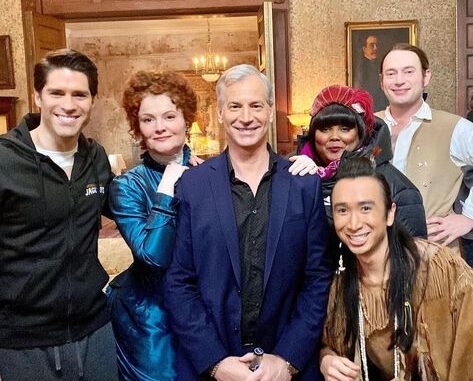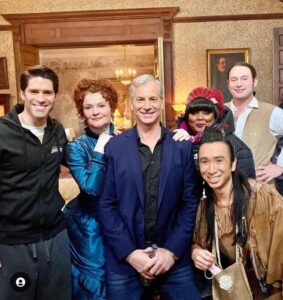
CBS’s Ghosts, a delightful blend of supernatural comedy and drama, has captured the hearts of viewers with its quirky and memorable characters. Among these characters, representation of diverse backgrounds—including Jewish representation—has sparked both appreciation and debate among audiences. Jewish representation in popular media remains a critical topic, as Jewish characters and storylines can challenge stereotypes, celebrate culture, and bring genuine diversity to our screens.
In this article, we’ll dive deep into CBS’s Ghosts to see if it delivers meaningful Jewish representation. How does the show handle Jewish identity, and does it provide a well-rounded portrayal? Let’s explore these questions, looking at how Ghosts navigates faith, humor, and cultural identity.

The Importance of Jewish Representation in Television
Jewish representation in television isn’t just about having a Jewish character—it’s about how that character is written, developed, and integrated into the storyline. Historically, portrayals of Jewish people on TV and film have been limited to certain stereotypes, often revolving around religion, appearance, or family dynamics. More nuanced representation offers an opportunity to move past these clichés, inviting broader audiences to understand and appreciate Jewish culture and heritage.
Overview of CBS’s Ghosts and Its Unique Character Line-Up
CBS’s Ghosts is an adaptation of the British show of the same name, and it introduces audiences to a wide cast of characters—some alive, some ghosts—all residing in a charming yet haunted mansion. The show blends comedy with heartfelt moments, and each character embodies a distinct historical period or cultural identity. These characters’ backstories reveal a mosaic of human experience, from different time periods, socioeconomic backgrounds, and, occasionally, religious affiliations.
Identifying Jewish Characters in Ghosts
A key point of debate about Jewish representation in Ghosts revolves around which characters are intended to reflect Jewish identity. While the show does not overtly label any ghost as Jewish, certain characters, like Hetty, a wealthy 19th-century socialite, exhibit traits and cultural references associated with the Jewish experience, sparking discussions among viewers.
Breaking Down the Nuances of Jewish Identity in Ghosts
Hetty’s Character: Jewish Representation or Stereotype?
Though Hetty’s background isn’t definitively labeled as Jewish, her wealthy, East Coast socialite persona may unintentionally play into stereotypes about Jewish people in upper society. Her sharp wit, humorous disdain for modernity, and strong family values resonate with certain Jewish cultural markers, yet the show doesn’t explicitly dive into her religious or cultural background.
Fanny: The Forgotten Ghost with Subtle Jewish Overtones
Another character that raises questions about Jewish representation is Fanny, a Puritan-era ghost who embodies a strict, rule-following personality. While her character doesn’t scream “Jewish,” some of her lines and interactions with other characters carry undertones of traditional Jewish values, such as respect for heritage and family loyalty. This, however, is subtle and far from a direct representation.
Is Ghosts Tackling Jewish Holidays and Rituals?
One way to explore Jewish identity in television is by showcasing religious holidays, rituals, and cultural practices. Unfortunately, Ghosts rarely delves into the personal practices of its characters, making it unclear whether any of them would celebrate Jewish holidays like Passover or Yom Kippur. The omission of these elements means that, while Jewish representation may be implied, it is not explicitly celebrated or explored.
Does Ghosts Avoid Jewish Stereotypes?
Handling Cultural Stereotypes Responsibly
Given the comedic nature of Ghosts, it’s easy to fall into caricatures or overused tropes. Thankfully, Ghosts often sidesteps these pitfalls by giving each character depth beyond stereotypical traits. While some characters might align with cultural archetypes, they’re generally given enough layers to avoid flat representation.
Balancing Humor with Sensitivity
Jewish representation in comedy can be tricky, as humor around Jewish identity often treads a fine line. However, Ghosts tends to take a lighthearted approach without making any character’s background the butt of the joke. By avoiding targeted humor based solely on identity, the show respects its characters’ integrity.
Representation vs. Tokenism: Where Does Ghosts Fall?
One common criticism of shows that try to diversify is the risk of tokenism—when characters from marginalized groups are included only to appear diverse without depth. Ghosts largely avoids tokenism by focusing on character development, ensuring each ghost, regardless of cultural background, has a backstory and personality that contributes meaningfully to the story. However, the vague Jewish representation leaves something to be desired in terms of authenticity.
Audience Reaction to Jewish Representation in Ghosts
Mixed Reviews from Jewish Viewers
Some Jewish viewers appreciate the subtle nods to Jewish identity in the show, feeling that it brings a quiet yet respectful inclusion. Others, however, would prefer a more direct acknowledgment of Jewish culture or faith, feeling that Ghosts falls short in celebrating Jewish characters as clearly as other cultural identities.
General Audience Perception
Non-Jewish viewers may not notice or consider the subtle Jewish elements, making it essential for Ghosts to clarify or deepen the backgrounds of its characters to provide all viewers with an understanding of the diversity it represents.
Comparing Ghosts’ Jewish Representation to Other Shows
To understand where Ghosts stands, it’s helpful to compare it to shows like The Marvelous Mrs. Maisel or Transparent, which place Jewish identity and culture front and center. Ghosts differs in that it isn’t a show about identity per se but about historical individuals who happen to be diverse. This approach has both advantages and disadvantages when it comes to effective Jewish representation.
The Future of Jewish Representation in CBS’s Ghosts
As Ghosts continues, the writers have a unique opportunity to expand on the characters’ backgrounds, potentially adding more explicit representation for Jewish culture. By incorporating cultural references, holiday celebrations, or direct acknowledgment of Jewish faith, the show could deepen its diversity and resonate with a broader audience.
Is Ghosts a Step Forward or a Missed Opportunity?
Whether Ghosts is a step forward in Jewish representation depends on perspective. On one hand, it offers subtle nods and avoids harmful stereotypes. On the other hand, it lacks explicit representation, leaving some viewers wanting more clarity and celebration of Jewish identity.
Conclusion
In the end, CBS’s Ghosts brings some elements of Jewish culture and identity to mainstream TV, but it stops short of fully developed Jewish representation. While the show is commendable for its diverse cast and respectful portrayal of its characters, it could benefit from a clearer acknowledgment of Jewish heritage, culture, and faith. With more episodes and seasons, the show has potential to expand on this foundation and bring a more robust, respectful portrayal of Jewish characters to its audience.
